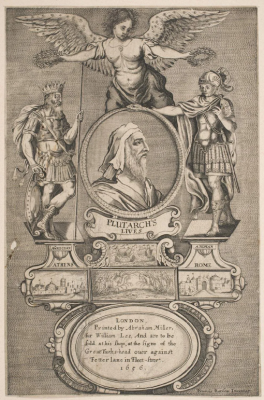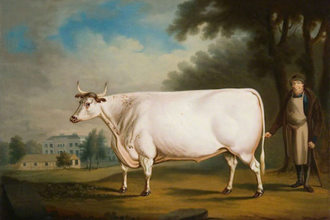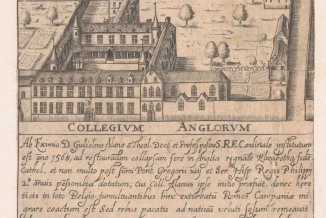Gospel in Art: James and John approached Jesus

Title Page to Plutarch's 'Lives of the Noble Grecians and Romans'. Translation by James Amiot London, Abraham Miller and William Lee. Printed in 1657, Engraving with etching on paper. © Philadelphia Museum of Art
Source: Christian Art
Gospel of 29 May 2024
Mark 10:32-45
The disciples were on the road, going up to Jerusalem; Jesus was walking on ahead of them; they were in a daze, and those who followed were apprehensive. Once more taking the Twelve aside he began to tell them what was going to happen to him: 'Now we are going up to Jerusalem, and the Son of Man is about to be handed over to the chief priests and the scribes. They will condemn him to death and will hand him over to the pagans, who will mock him and spit at him and scourge him and put him to death; and after three days he will rise again.'
James and John, the sons of Zebedee, approached him. 'Master,' they said to him 'we want you to do us a favour.' He said to them, 'What is it you want me to do for you?' They said to him, 'Allow us to sit one at your right hand and the other at your left in your glory.' 'You do not know what you are asking' Jesus said to them. 'Can you drink the cup that I must drink, or be baptised with the baptism with which I must be baptised?' They replied, 'We can.' Jesus said to them, 'The cup that I must drink you shall drink, and with the baptism with which I must be baptised you shall be baptised, but as for seats at my right hand or my left, these are not mine to grant; they belong to those to whom they have been allotted.'
When the other ten heard this they began to feel indignant with James and John, so Jesus called them to him and said to them, 'You know that among the pagans their so-called rulers lord it over them, and their great men make their authority felt. This is not to happen among you. No; anyone who wants to become great among you must be your servant, and anyone who wants to be first among you must be slave to all. For the Son of Man himself did not come to be served but to serve, and to give his life as a ransom for many.'
Reflection on the Book Title Page
We are all prone to selective listening, filtering out what we want to hear and ignoring what we don't. It's a habit ingrained in our daily interactions. Just as in a bustling restaurant, where we focus on our table's conversation while tuning out the rest. Similarly, in today's Gospel reading, we see the disciples exhibiting selective listening to Jesus' words, having blocked out some crucial things he's been telling them before. Despite his earlier teachings about his impending death and departure, they hadn't fully 'heard' him or grasped the gravity of his message. James and John's subsequent questions revealed their lack of attentive listening.
The reading today reminds me of Plutarch (46-119AD). Plutarch was a philosopher, writer, magistrate and, later in his life, a priest at the Temple of Apollo. He wrote some letters on the art of listening. In them he describes different kinds of listeners. About the selective listener he says: 'the selective listener is someone who is very good at listening - to what they want to hear'. He refers to the fact that we listen to what most interests us or what excites us the most. We find it easier to listen to people we like or admire and to topics that we enjoy. Fair enough. Plutarch warns us, however, that if we listen only to the things which are pleasing to us, we may miss many vital, life-giving and important learnings.
Our illustration is the title page of Plutarch's "Lives of the Noble Grecians and Romans". It is a monumental work of biographical literature that provides a detailed account of the lives of prominent figures from ancient Greece and Rome. Written in the 1st century AD, this collection of biographies offers a captivating glimpse into the lives, characters, and achievements of some of the most influential individuals of antiquity. Plutarch pairs Greek and Roman figures, comparing their virtues, vices, and contributions to history. Through vivid storytelling and insightful analysis, he delves into the motivations, triumphs, and downfalls of figures like Alexander the Great, Julius Caesar, Pericles, and many others. He especially explores what these figures would say, in order to get the listening ears of the people.
LINKS
Gospel in Art: https://christian.art/
Today's Reflection: https://christian.art/daily-gospel-reading/mark-10-32-45-2024/
and Art and Christianity on Songs of Praise: www.indcatholicnews.com/news/49830


















